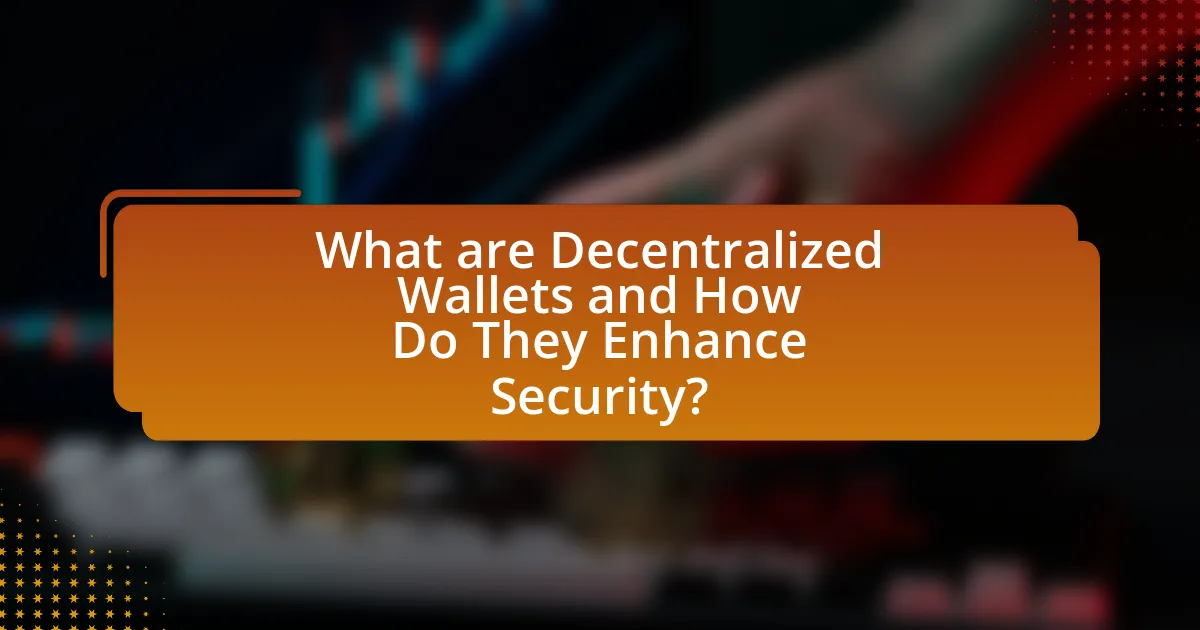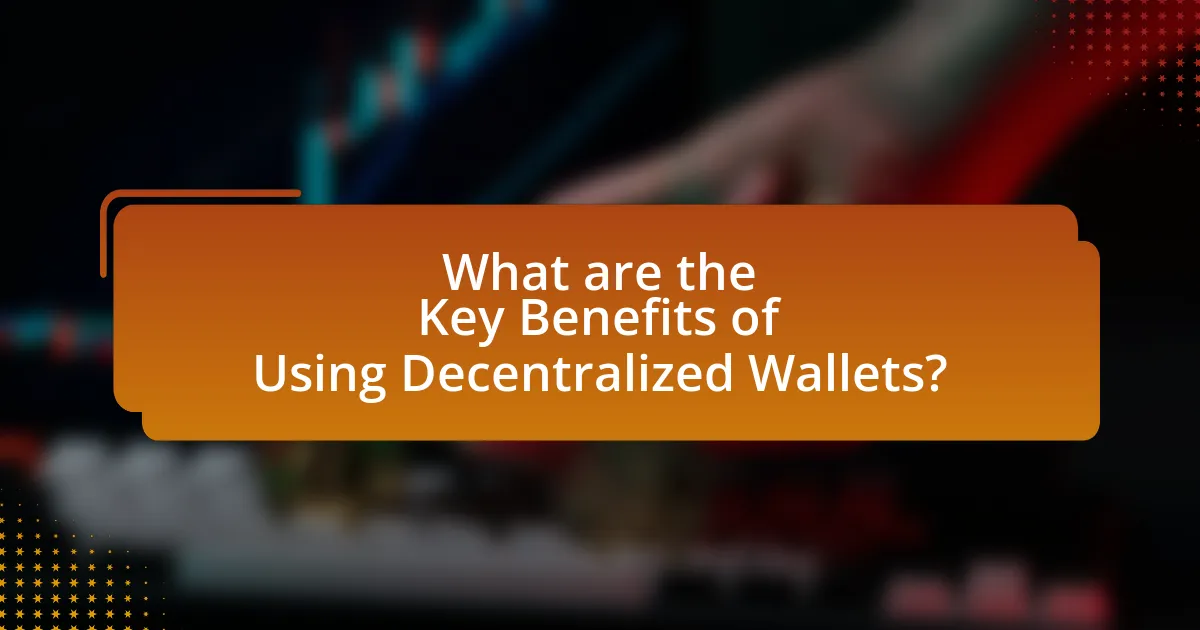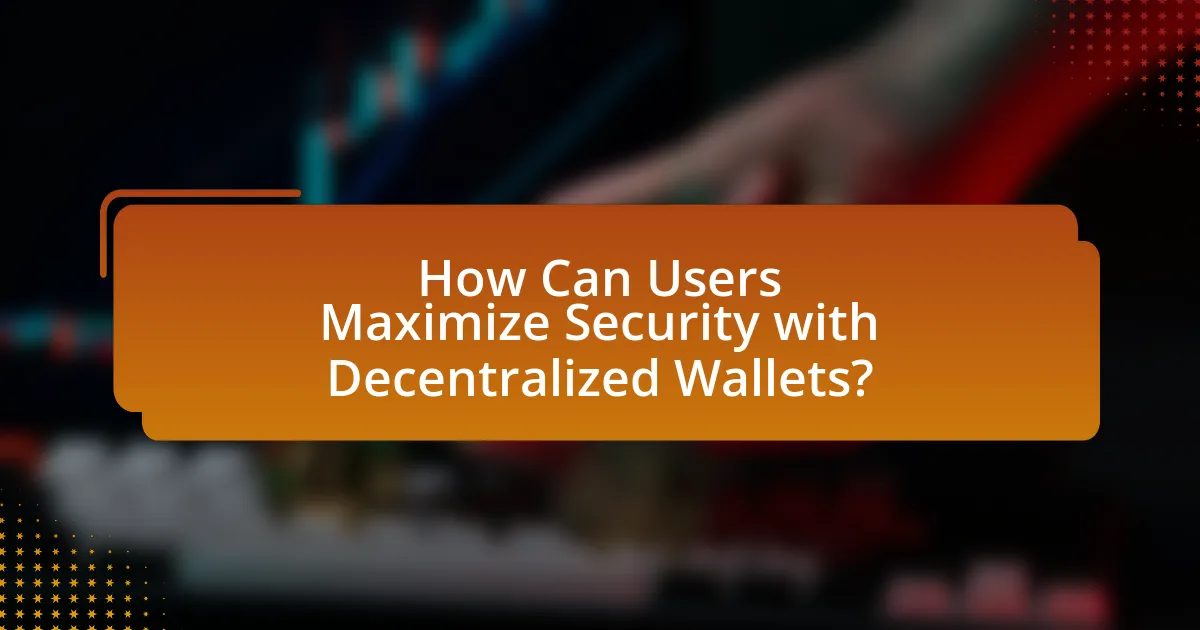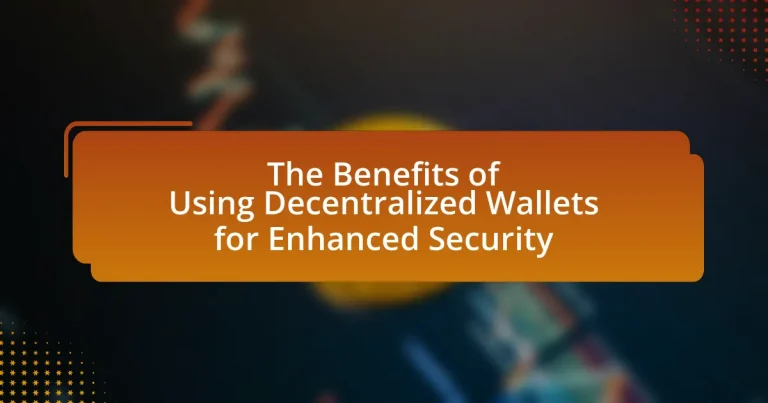Decentralized wallets are digital tools that enable users to store and manage cryptocurrencies independently, without the need for a central authority. This article explores how decentralized wallets enhance security by allowing users to maintain control over their private keys, significantly reducing the risk of hacking and unauthorized access. It contrasts decentralized wallets with traditional centralized wallets, highlighting the vulnerabilities associated with the latter. Additionally, the article discusses the role of blockchain technology in securing transactions, common security threats faced by cryptocurrency users, and best practices for maximizing security when using decentralized wallets. Overall, it emphasizes the importance of user control and the benefits of decentralized wallets in protecting digital assets.

What are Decentralized Wallets and How Do They Enhance Security?
Decentralized wallets are digital wallets that allow users to store and manage their cryptocurrencies without relying on a central authority or intermediary. These wallets enhance security by giving users full control over their private keys, which are essential for accessing and managing their funds. Unlike centralized wallets, where private keys are stored on a server, decentralized wallets keep keys on the user’s device, significantly reducing the risk of hacking and unauthorized access. Additionally, decentralized wallets often utilize advanced cryptographic techniques and protocols, such as multi-signature authentication, to further bolster security, ensuring that transactions require multiple approvals before execution. This decentralized approach minimizes vulnerabilities associated with single points of failure, making it a more secure option for cryptocurrency management.
What distinguishes decentralized wallets from traditional wallets?
Decentralized wallets are distinguished from traditional wallets primarily by their control over private keys and the absence of a central authority. In decentralized wallets, users maintain sole ownership of their private keys, which enhances security and reduces the risk of hacks associated with centralized storage. Traditional wallets, on the other hand, often rely on third-party services to manage private keys, making them vulnerable to breaches. According to a report by CipherTrace, over $1.9 billion was lost in cryptocurrency hacks in 2020, highlighting the risks associated with centralized wallet services. This control in decentralized wallets not only empowers users but also aligns with the principles of blockchain technology, promoting transparency and security.
How do decentralized wallets store private keys?
Decentralized wallets store private keys locally on the user’s device, ensuring that the keys are not held by any third party. This local storage method enhances security by minimizing the risk of hacks or unauthorized access that can occur when private keys are stored on centralized servers. Additionally, many decentralized wallets utilize encryption techniques to further protect the private keys, making it difficult for malicious actors to access them. This approach aligns with the fundamental principle of decentralization, where users maintain full control over their assets without relying on intermediaries.
What role does blockchain technology play in decentralized wallets?
Blockchain technology serves as the foundational infrastructure for decentralized wallets by enabling secure, transparent, and tamper-proof transactions. Each transaction recorded on the blockchain is immutable, meaning it cannot be altered or deleted, which enhances the security of assets stored in decentralized wallets. Furthermore, blockchain’s decentralized nature eliminates the need for a central authority, allowing users to maintain full control over their private keys and funds. This control reduces the risk of hacks and fraud associated with centralized systems, as evidenced by the significant number of breaches in centralized exchanges. Thus, blockchain technology is crucial for ensuring the integrity and security of decentralized wallets.
Why is security a critical concern in cryptocurrency management?
Security is a critical concern in cryptocurrency management because the decentralized nature of cryptocurrencies makes them susceptible to hacking, fraud, and theft. In 2021 alone, over $14 billion was lost to cryptocurrency theft, highlighting the vulnerabilities associated with centralized exchanges and wallets. Additionally, the irreversible nature of cryptocurrency transactions means that once funds are stolen, they cannot be recovered, further emphasizing the need for robust security measures. Therefore, effective security protocols are essential to protect assets and maintain user trust in the cryptocurrency ecosystem.
What common security threats do cryptocurrency users face?
Cryptocurrency users face several common security threats, including phishing attacks, malware, and exchange hacks. Phishing attacks involve fraudulent attempts to obtain sensitive information by masquerading as trustworthy entities, often through emails or fake websites. Malware can compromise users’ devices, allowing attackers to steal private keys or access wallets. Additionally, exchange hacks have resulted in significant losses, with exchanges being targeted for their large pools of cryptocurrency assets. For instance, the 2014 Mt. Gox hack led to the loss of approximately 850,000 Bitcoins, highlighting the vulnerabilities associated with centralized exchanges.
How do centralized wallets expose users to greater risks?
Centralized wallets expose users to greater risks primarily due to their reliance on a single point of control, which makes them attractive targets for hackers. When users store their cryptocurrencies in centralized wallets, they entrust their private keys to a third party, increasing the likelihood of theft or loss. For instance, in 2014, the Mt. Gox exchange, a centralized wallet provider, was hacked, resulting in the loss of approximately 850,000 Bitcoins, highlighting the vulnerabilities associated with centralized storage. Additionally, centralized wallets can be subject to regulatory actions or shutdowns, further jeopardizing user access to their funds.

What are the Key Benefits of Using Decentralized Wallets?
Decentralized wallets provide enhanced security, as they allow users to maintain control over their private keys without relying on third-party services. This control minimizes the risk of hacks and theft associated with centralized exchanges, where user funds are often vulnerable. According to a report by Chainalysis, in 2021, over $3.2 billion was stolen from centralized exchanges, highlighting the security risks involved. Additionally, decentralized wallets facilitate greater privacy, as transactions do not require personal information, further protecting user identities. These benefits make decentralized wallets a preferred choice for individuals seeking to secure their digital assets effectively.
How do decentralized wallets provide enhanced security features?
Decentralized wallets provide enhanced security features by allowing users to maintain control over their private keys, which are essential for accessing and managing their cryptocurrency. Unlike centralized wallets, where private keys are stored on a server controlled by a third party, decentralized wallets store keys locally on the user’s device. This reduces the risk of hacks and unauthorized access, as there is no central point of failure. Additionally, many decentralized wallets implement advanced encryption techniques and multi-signature authentication, further safeguarding user assets. For instance, a study by the Blockchain Research Institute highlights that decentralized wallets significantly lower the likelihood of theft compared to centralized alternatives, reinforcing their security advantages.
What is the significance of user control over private keys?
User control over private keys is significant because it ensures that individuals have sole ownership and access to their digital assets. This control minimizes the risk of unauthorized access or theft, as only the user possesses the keys needed to authorize transactions. According to a report by Chainalysis, 70% of cryptocurrency thefts occur due to compromised private keys, highlighting the importance of user control in safeguarding assets. By managing their own private keys, users can enhance their security and maintain full autonomy over their funds, reducing reliance on third-party services that may be vulnerable to hacks or mismanagement.
How does the absence of a central authority improve security?
The absence of a central authority improves security by eliminating a single point of failure that can be targeted by attackers. In decentralized systems, control and data are distributed across multiple nodes, making it significantly harder for malicious actors to compromise the entire network. For instance, in blockchain technology, each transaction is verified by numerous participants, which enhances transparency and reduces the risk of fraud. This distributed verification process ensures that even if one node is attacked, the integrity of the overall system remains intact, as evidenced by the resilience of Bitcoin’s network, which has operated securely despite numerous attempts at hacking centralized exchanges.
What additional advantages do decentralized wallets offer?
Decentralized wallets offer enhanced privacy, control over funds, and reduced reliance on third parties. Users maintain full ownership of their private keys, which minimizes the risk of hacks associated with centralized exchanges. Additionally, decentralized wallets often allow for anonymous transactions, protecting user identities and transaction histories. According to a report by Chainalysis, decentralized finance (DeFi) platforms have seen a significant increase in user adoption, highlighting the growing trust in decentralized solutions for secure asset management.
How do decentralized wallets promote privacy for users?
Decentralized wallets promote privacy for users by allowing them to control their private keys and manage their transactions without relying on third-party intermediaries. This direct control means that users’ financial information is not stored on centralized servers, reducing the risk of data breaches and unauthorized access. Additionally, decentralized wallets often utilize advanced cryptographic techniques to obfuscate transaction details, making it difficult for external parties to trace the flow of funds. For instance, many decentralized wallets support features like coin mixing or privacy coins, which further enhance anonymity by obscuring transaction origins and destinations.
What are the cost benefits associated with decentralized wallets?
Decentralized wallets offer significant cost benefits primarily through reduced transaction fees and enhanced control over funds. Users of decentralized wallets typically avoid high fees associated with centralized exchanges, as transactions occur directly on the blockchain without intermediaries. For instance, Bitcoin transactions can incur fees ranging from a few cents to several dollars on centralized platforms, while decentralized transactions often have lower fees due to the absence of third-party processing. Additionally, decentralized wallets empower users to manage their own private keys, eliminating the risk of custodial fees charged by centralized services for holding assets. This self-custody model not only saves costs but also enhances financial autonomy, allowing users to transact without reliance on external entities.

How Can Users Maximize Security with Decentralized Wallets?
Users can maximize security with decentralized wallets by implementing strong password practices, enabling two-factor authentication, and regularly updating wallet software. Strong passwords reduce the risk of unauthorized access, while two-factor authentication adds an additional layer of security by requiring a second form of verification. Regular software updates ensure that users benefit from the latest security patches and features, thereby protecting against vulnerabilities. According to a report by the Cybersecurity & Infrastructure Security Agency, using multi-factor authentication can reduce the risk of account compromise by 99.9%.
What best practices should users follow when using decentralized wallets?
Users should follow several best practices when using decentralized wallets to enhance security. First, they must ensure that they use strong, unique passwords and enable two-factor authentication (2FA) whenever possible, as these measures significantly reduce the risk of unauthorized access. Additionally, users should regularly back up their wallet information, including private keys and recovery phrases, in secure locations to prevent loss of access to their funds.
Moreover, users should be cautious of phishing attempts and only interact with trusted platforms and applications, as malicious actors often target wallet users. Keeping wallet software updated is also crucial, as updates often include security patches that protect against vulnerabilities. Finally, users should consider using hardware wallets for storing large amounts of cryptocurrency, as these devices provide an additional layer of security by keeping private keys offline. Following these practices can significantly mitigate risks associated with decentralized wallets.
How can users securely back up their wallets?
Users can securely back up their wallets by creating multiple copies of their wallet’s recovery phrase and storing them in different secure locations. This method ensures that even if one copy is lost or damaged, others remain accessible. For instance, writing the recovery phrase on paper and keeping it in a safe deposit box, along with a digital copy stored in an encrypted format on a secure cloud service, provides redundancy and protection against theft or loss. This approach is validated by the fact that many cryptocurrency experts recommend using a combination of physical and digital storage methods to enhance security and accessibility.
What steps can users take to protect their private keys?
Users can protect their private keys by employing several key strategies. First, they should store private keys in hardware wallets, which provide a secure offline environment, reducing exposure to online threats. Additionally, users must enable two-factor authentication (2FA) on their wallets and accounts, adding an extra layer of security against unauthorized access. Regularly updating software and wallets ensures that users benefit from the latest security patches, mitigating vulnerabilities. Furthermore, users should avoid sharing their private keys and be cautious of phishing attempts, as these are common methods for attackers to gain access. Lastly, creating strong, unique passwords for wallet accounts enhances security by making it more difficult for attackers to compromise accounts. These steps collectively contribute to a robust defense against potential threats to private keys.
What common mistakes should users avoid with decentralized wallets?
Users should avoid common mistakes such as neglecting to back up their wallet recovery phrases, using weak passwords, and falling for phishing scams. Neglecting to back up recovery phrases can lead to irreversible loss of access to funds, as these phrases are essential for wallet recovery. Using weak passwords increases vulnerability to unauthorized access, making it easier for attackers to compromise the wallet. Falling for phishing scams can result in users inadvertently providing sensitive information to malicious actors, leading to theft of assets. According to a report by the Federal Trade Commission, phishing scams accounted for over $1.8 billion in losses in 2020, highlighting the importance of vigilance against such threats.
How can users identify phishing attempts related to their wallets?
Users can identify phishing attempts related to their wallets by scrutinizing the authenticity of communications and links they receive. Phishing attempts often involve emails or messages that appear to be from legitimate wallet providers but contain suspicious URLs or requests for sensitive information. For instance, legitimate wallet services will never ask for private keys or passwords via email. Additionally, users should check for spelling errors, unusual sender addresses, and verify URLs by hovering over links before clicking. According to the Anti-Phishing Working Group, phishing attacks targeting cryptocurrency wallets have increased significantly, highlighting the importance of vigilance in recognizing these threats.
What are the risks of using public Wi-Fi with decentralized wallets?
Using public Wi-Fi with decentralized wallets poses significant risks, primarily due to the vulnerability of unsecured networks to cyberattacks. Attackers can intercept data transmitted over public Wi-Fi, allowing them to access sensitive information such as private keys or recovery phrases associated with decentralized wallets. According to a study by the Federal Trade Commission, over 80% of public Wi-Fi networks lack adequate security measures, making them prime targets for hackers. Furthermore, man-in-the-middle attacks can occur, where an attacker secretly relays and possibly alters the communication between two parties, further compromising wallet security. Thus, the combination of unsecured networks and the sensitive nature of decentralized wallets creates a high-risk environment for users.
What resources are available for further learning about decentralized wallets?
Comprehensive resources for further learning about decentralized wallets include online courses, articles, and community forums. Websites like Coursera and Udemy offer courses specifically focused on blockchain technology and decentralized finance, which cover the functionality and security of decentralized wallets. Additionally, platforms such as Medium and CoinDesk publish articles that explore the latest trends and best practices in using decentralized wallets. Community forums like Reddit and BitcoinTalk provide user-generated discussions and insights, allowing learners to engage with experienced users and developers. These resources collectively enhance understanding and knowledge of decentralized wallets and their security benefits.


